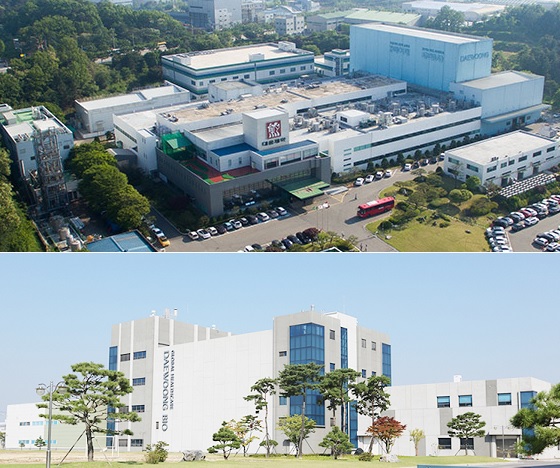Daewoong is accelerating its global expansion
250 billion won investment in two new factories
Kim, Jin-Gu 기자 2023-05-04 06:19:34
Daewoong Pharmaceutical, Nabota 3 factory construction
Botulinum production capacity increased by 3.6 times
Daewoong Bio promotes the construction of a new plant, with full-scale global CDMO business

▲ A view of Daewoong Pharmaceutical’s Hyangnam factory (above) and Daewoong Bio’s Hyangnam factory
◆Production capacity increased 3.6 times with the establishment of the 3rd factory in Nabota,
Will the utilization rate decrease to 150%?
According to the pharmaceutical industry on the 4th, Daewoong Pharmaceutical has begun construction of a third plant exclusively for producing Nabota, a botulinum toxin. Daewoong Pharmaceutical plans to complete the construction by 2024 at a cost of 103.6 billion won. The third factory located in Hyangnam-eup, Hwaseong-si, Gyeonggi-do has an annual production capacity of 13 million vials. The production capacity of the existing Nabota Plants 1 and 2 was 5 million vials. This means that after 2024, Nabota production capacity will expand to 3.6 times the current level. Daewoong Pharmaceutical explained that it is setting out to establish a new plant to respond to the expanding global demand for Nabota. Daewoong Pharmaceutical achieved sales of 142.1 billion won with Nabota last year. It increased by 79% compared to 79.6 billion won in 2021. In particular, exports of Nabota increased 2.3 times in one year to 109.8 billion won.
The production capacity of Daewoong Pharmaceutical's Hyangnam plant, including Nabota, has steadily expanded since 2018. It more than doubled in four years from 5.8 billion won in 2018 to 6.2 billion won in 2019, 9.3 billion won in 2020, 10 billion won in 2021, and 14.4 billion won last year. The utilization rate has already exceeded 100%. 159% in 2018, 156% in 2019, 149% in 2020, 143% in 2021, and 165% last year. The utilization rate of the entire Hyangnam plant is also steadily maintained at 150-160%. This means that even though factories are operating beyond their limits, the situation continues to be difficult to meet demand.
In particular, in February 2021, Daewoong Pharmaceutical's US partner, Evolus, signed a three-way agreement with Medytox and AbbVie to eliminate risks associated with local sales of 'Jubo (Nabota's US product name)', and exports are rapidly increasing. Daewoong Pharmaceutical launched Nabota in the UK in September of last year, aiming to enter the European market in earnest. Daewoong Pharmaceutical obtained product approval from the EC in October 2019. It has been registered in 62 countries around the world so far and plans to release products in 9 European countries, China, Egypt, Chile, Australia, New Zealand, Singapore, and Malaysia. Daewoong Bio, entering the global CDMO business with the construction of a new plant, expects synergy with Daewoong Pharmaceutical. Daewoong Bio also announced an expansion of its production capacity recently. Daewoong Bio announced in January that it would build a microbe-based plant. At the same time, it announced that it would enter the global CDMO business. It plans to expand its business area from the production of existing raw materials and finished drugs.
Daewoong Bio is operating its Hyangnam and Anseong factories in Korea. The production capacity of the Hyangnam plant is 200,000 liters per year. It has production lines dedicated to raw materials, UDCA, and Fexuclue, which are raw materials for Ursa. The Anseong plant has an annual production capacity of 400 million tablets and produces Gliatamine, Atorvastatin, and Clopidogrel.
The new plant, with an investment of 146 billion won, is expected to serve as an outpost for the global CDMO business. In the pharmaceutical industry, there is a prospect that the CDMO business structure from Daewoong Pharmaceutical to Daewoong Bio will be completed. Daewoong Pharmaceutical obtained permission for an advanced regenerative medicine cell processing facility from the Ministry of Food and Drug Safety in July last year. Daewoong Pharmaceutical has been able to speed up the development of cell and gene therapy products by obtaining permission for cell processing facilities in addition to the existing high-tech biopharmaceutical manufacturing and management businesses such as human tax cells.
If Daewoong Pharmaceutical's Yongin Bio Center provides services such as the development and quality testing of cell and gene therapy products, it is expected that Daewoong Bio's new plant will be able to complete the CDMO business structure in charge of the production of related products. It is analyzed that both Daewoong Pharmaceutical and Daewoong Bio made a bold investment decision at the group company level in the construction of a new plant. The 103.6 billion won invested in Daewoong Pharmaceutical's new plant construction amounts to 14% of its equity capital (741.2 billion won) at the end of last year. Daewoong Bio plans to invest 40% of its equity capital (365.1 billion won) in the construction of a new plant at the end of last year.
Kim, Jin-Gu 기자 (kjg@dailypharm.com)